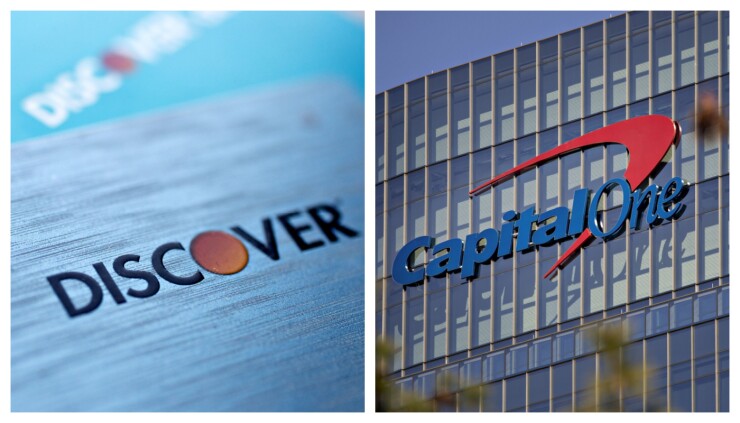
Capital One Financial and Discover Financial Services spent months talking — and even walked away from negotiations at one point — before the two companies
In the second half of last year, as Riverwoods, Illinois-based Discover was dealing with a series of compliance and operational challenges, investment bankers started inquiring about the company's interest in a potential sale, Capital One said in a securities filing Friday. The filing provides new details about how
One of the people who reached out to Discover's board chair, Thomas Maheras, was Stephen Crawford, an advisor to Capital One CEO Richard Fairbank. Crawford first made contact in the middle of August, according to the filing.
Discover CEO Roger Hochschild
On at least three occasions between September and November 2023, Maheras informed Crawford that Discover was "not actively seeking a combination or other strategic transaction," according to the securities filing.
During months of back-and-forth between the two parties, Crawford floated the idea of Capital One paying a 30% price premium. He later suggested that McLean, Virginia-based Capital One might be willing to increase the offer to 33%.
At that point, Discover's management team decided to engage in due diligence and discussions with Capital One, according to the filing.
The two parties executed a nondisclosure agreement on Thanksgiving Day, Nov. 23. On Dec. 2, Capital One provided an initial draft of a merger agreement to Discover.
But five days later, on the same day that Discover finalized
Then on Dec. 14, at a regularly scheduled Capital One board meeting, Fairbank and Crawford updated the board about the decision to not proceed with due diligence and potential acquisition negotiations.
The update "included a review of potential opportunities and risks presented by a potential acquisition of Discover … including compliance-related risks and financial risks," as well as what it might look like if Capital One pursued a potential acquisition of Discover in the future, the filing said.
Although discussions had ceased, Capital One kept its eye on Discover's business and financial performance over the next six weeks, and on Jan. 26, Crawford called Maheras to say that Capital One "may potentially be interested in resuming the discussions," according to the filing.
A week before, Discover reported that its net income in the fourth quarter of 2023 had
At a Capital One board meeting in early February, the company's management shared information about Discover's 2023 financial results, its credit portfolio, its payment network and more. Management reviewed "potential cost savings, revenue synergies and other benefits that could be realized" if Capital One acquired Discover, as well as potential risks and compliance issues.
Banking regulators and the Department of Justice must decide whether the blockbuster deal raises antitrust concerns. Looming over their analyses are questions about how broadly or narrowly to define the relevant markets.
The Capital One board "unanimously supported" the idea of reengaging Discover in negotiations and told management to try to put a deal together quickly, according to the securities filing. On Feb. 5, Crawford presented a new offer to Maheras whereby Capital One would pay a fixed exchange ratio of 1.0192 shares of Capital One common stock for each share of Discover common stock.
The offer was 30% above the trading price of Discover's common stock when the market closed on Feb. 2.
Four days after Capital One made its offer, Discover's board considered the updated terms, the benefits of being acquired by Capital One and the feasibility of negotiating a definitive agreement before Feb. 20. A flurry of meetings took place between Feb. 11 and Feb. 18, as both sides continued to perform due diligence and considered potential the benefits and risks in joining forces.
On Presidents Day, which fell on Feb. 19, the parties agreed that three members of Discover's board would join Capital One's board upon closing a potential deal. Later that day, Capital One and Discover signed a definitive agreement, and the deal was announced in a joint press release that evening.
Over the last two months, the deal has drawn opposition from






